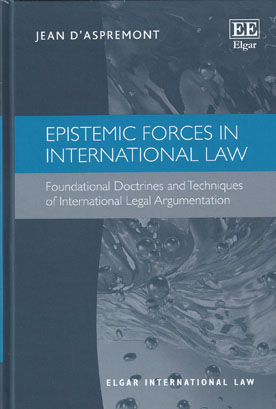We are now closed for the Christmas and New Year period, returning on Monday 5th January 2026. Orders placed during this time will be processed upon our return on 5th January.

Epistemic Forces in International Law examines the methodological choices of international lawyers through considering theories of statehood, sources, institutions and law-making. From this examination, Jean d'Aspremont presents a discerning insight into the way in which international lawyers shape their arguments to secure validation within the international law community.
'To whom does international law belong? International lawyers have shaped our understanding of the nature as well as of the content of the discipline to an unusually high degree. This book explores this phenomena, probing the nature of the community of international lawyers that engage in this practice, its causes, consequences and the means through which it is accomplished.
Here, d'Aspremont offers a principled defence of a position that is not only the unavoidable fate of the international lawyer but also the best hope for the rational development of international law.' - Vaughan Lowe, Oxford University, UK 'Jean d'Aspremont is one of the more thoughtful and creative international legal academics of his generation. In this volume of essays, he aims to explore how the 'invisible college of international lawyers' (to use a famous phrase) works, based on the idea that insight into the way international lawyers work will also tell us something of great value about international law itself.
The result is sometimes compelling, sometimes controversial, and invariably thought-provoking: a must-read for the self-reflective international lawyer.' - Jan Klabbers, University of Helsinki, Finland